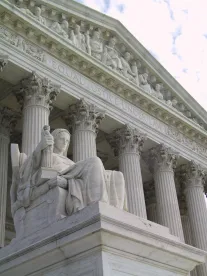The Supreme Court of the United States has agreed to resolve a circuit split about how courts should interpret collective bargaining agreements that provide for health insurance benefits for retired employees in M&G Polymers USA, LLC v. Tackett. The U.S. Court of Appeals for the Sixth Circuit says that such retiree health insurance benefits carry with them an inference that they are vested, or guaranteed to continue for life, while the majority of the other federal appellate courts require specific durational language to find that benefits are vested. Given the high cost of retiree health insurance on many employers’ balance sheets, M&G Polymers USA could represent a game changer for employers’ ability to modify retiree benefits going forward.
In a surprising development, the Supreme Court of the United States granted certiorari on May 5, 2014, in M&G Polymers USA, LLC v. Tackett, an appeal that should resolve a split among the federal appellate courts over how to interpret the duration of retiree health insurance benefits provided under collective bargaining agreements.
Coupled with the recent changes in health insurance markets, the decision in M&G Polymers USA, LLC v. Tackett (expected in the spring of 2015) could be a game changer for companies currently providing retiree health insurance benefits to their union employees and retirees, especially for operations in Michigan, Ohio, Kentucky and Tennessee.
The U.S. Court of Appeals for the Sixth Circuit has held since 1983 that retiree health insurance benefits provided in collective bargaining agreements carry an inference that they are vested or guaranteed to continue for life where the agreement is silent as to their duration. The majority of the other federal appellate courts have consistently held that retiree health insurance benefits are not vested or lifetime unless there is specific durational language saying that the benefits will continue beyond the term of a collective bargaining agreement.
The practical effect of the circuit split has been that identical collective bargaining agreements are interpreted in contradictory ways depending on where plan participants, their union and the employer end up in court. For example, a federal district court sitting in Ohio would more likely find that a collective bargaining agreement stating that retiree benefits “will continue” provides for lifetime health insurance benefits. However, courts interpreting identical contract language one state to the east in Pennsylvania (in the Third Circuit) or one state to the west in Indiana (in the Seventh Circuit) would more likely find that those retiree health insurance benefits are not vested and could be unilaterally changed by the employer at the end of the collective bargaining agreement if not renewed. Given the actuarial costs of and accounting requirements for lifetime retiree health insurance benefits, this difference in legal analysis can have a significant effect on a company’s balance sheet.
The Supreme Court has repeatedly denied similar petitions for certiorari urging the Supreme Court to address this circuit split about collectively bargained retiree health insurance benefits. Yesterday’s grant of certiorari comes as a surprising (and welcome) development. While one can only speculate as to why the Supreme Court chose to address this issue at this particular time, recent changes in the legal landscape for health insurance may be a factor. Courts deciding retiree health insurance cases have often commented on the potential hardship to retirees from a change in employer-provided retiree health insurance benefits. Recent improvements in Medicare, implementation of the Affordable Care Act and changes in the individual health insurance market in general may alleviate this hardship concern and undercut the “status benefit” logic of the Yard-Man inference. Regardless of the reason behind the court accepting this appeal, M&G Polymers USA, LLC v. Tackett provides the Supreme Court with a unique opportunity to provide certainty and uniformity on the important topic of the proper interpretation of collectively bargained retiree health insurance benefits.
The legal issue the Supreme Court will decide can be traced back to the enactment of ERISA in 1974. In passing ERISA, Congress made the conscious decision to provide that pension benefits were vested (i.e. once provided to employees, the benefits were unchangeable by the company), but that health insurance benefits were not. As a result, retiree health insurance benefits were only vested if provided for in an agreement with the company; in cases involving collective bargaining agreements, the Labor Management Relations Act also applied. However, federal appellate courts split over how to interpret collective bargaining agreements that provided for retiree health insurance benefits but did not explicitly include language on the duration of those benefits. The circuit split over how to interpret the provision of retiree health insurance benefits in collective bargaining agreements first arose in UAW v. Yard-Man, Inc., 716 F.2d 1476 (6th Cir. 1983). In Yard-Man, the Sixth Circuit found that retiree benefits were “status benefits” for retired employees that carry an inference that they continue for as long as the beneficiary remains retired. While the Sixth Circuit has attempted to restrain the language of the Yard-Man inference in recent years, the continuing practical effect of this decision is that, absent language explicitly limiting the benefits to the term of the collective bargaining agreement, district courts within the Sixth Circuit (i.e., Michigan, Ohio, Kentucky and Tennessee) frequently find that retiree health insurance benefits are vested or provided for the life of the retirees.
The Yard-Man approach stands in stark contrast to the decisions of other federal appellate courts, which generally hold that retiree benefits are not vested and can be changed at the expiration of the collective bargaining agreement, absent language explicitly providing for lifetime benefits. For example, the Third Circuit forcefully disagreed with Yard-Man in UAW v. Skinner Engine Co., 188 F.3d 130 (3d Cir. 1990), a case decided by a panel including now-Justice Samuel Alito, holding that benefits are not vested absent clear and unambiguous language to that effect. The Second and Seventh Circuits also have required language in collective bargaining agreements that can reasonably support a finding of lifetime health insurance benefits. The Supreme Court hopefully will resolve which approach the lower courts should follow—a decision that will affect how employers should approach collective bargaining about health benefits and any analysis about eliminating or changing retiree health benefits.




 />i
/>i
